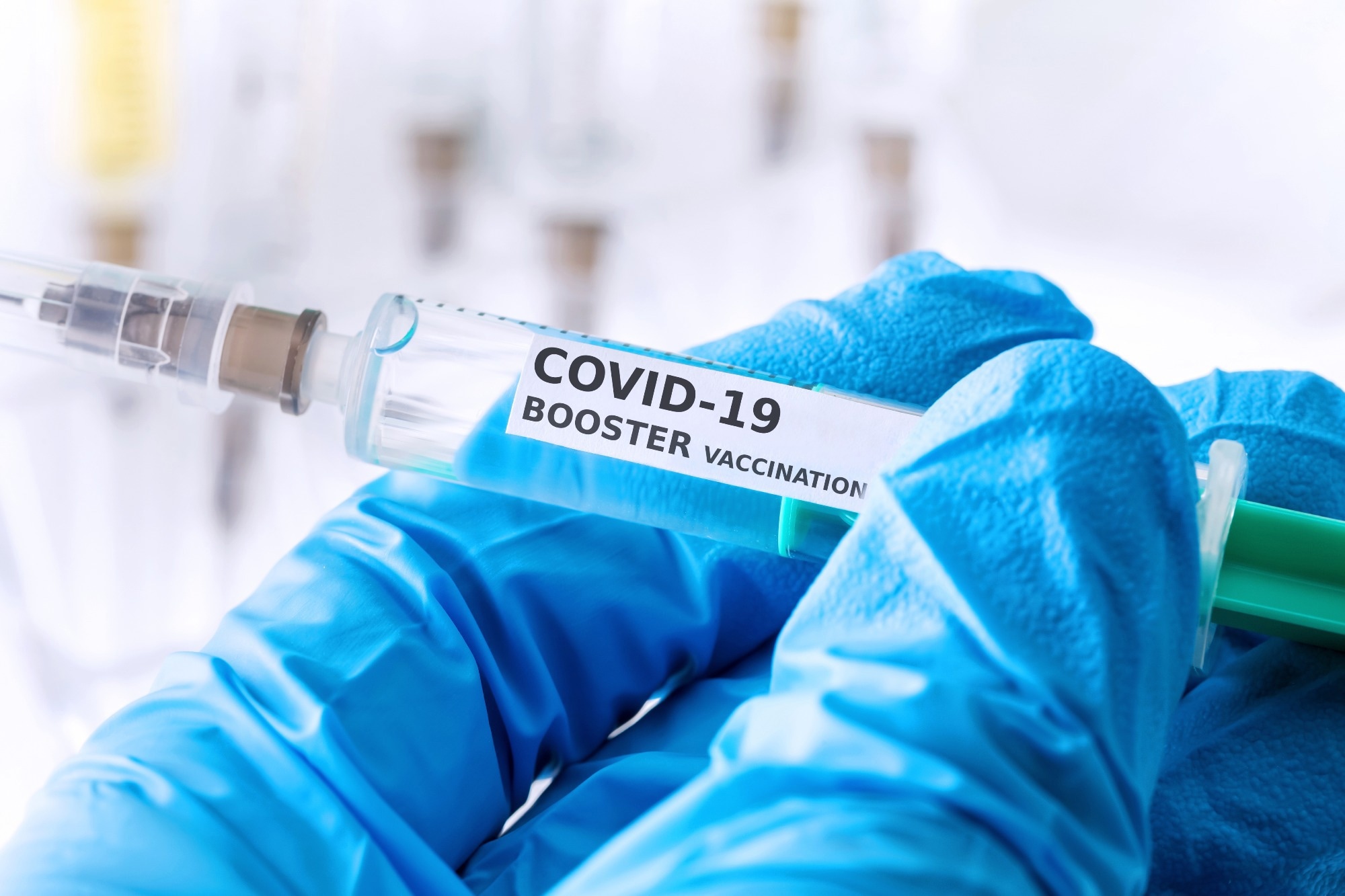Serum samples were taken after six months of the first booster vaccination and two weeks and six months after the second booster vaccination with the Spikevax monovalent ribonucleic acid (RNA) vaccine.
 Study: The fourth vaccination with a non-SARS-CoV-2 variant adapted vaccine fails to increase the breadth of the humoral immune response. Image Credit: Tobias Arhelger/Shutterstock.com
Study: The fourth vaccination with a non-SARS-CoV-2 variant adapted vaccine fails to increase the breadth of the humoral immune response. Image Credit: Tobias Arhelger/Shutterstock.com
Background
The coronavirus disease 2019 (COVID-19) infection landscape has been dominated by Omicron, with its subvariants having high immune evasiveness due to the absence of epitopes identified by neutralizing antibodies.
Monoclonal antibodies (mAbs) are inefficient against current Omicron strains, and vaccine-preventable illnesses are increasing.
Booster vaccines are offered to improve variant neutralization because of swift increases in antibody titers within 14 days of vaccination, offering the highest protective immunity against the COVID-19-causing virus.
The initial antibody concentration is produced by immunological memory and induces a greater immunological response via somatic hypermutations and the development of affinity for antibodies.
From February 2022 onwards, a second booster dose of a non-adapted, monovalent COVID-19 vaccine has been proposed for a few high-risk populations in Germany.
About the study
In the present study, researchers investigated and evaluated the impact of the fourth vaccination (2nd booster) on humoral immune responses.
For the analysis, 11 healthcare professionals, aged between 27 and 63 years, with no prior COVID-19 history, who had been administered the third vaccine (first booster) dose six months prior were recruited, the time point corresponding to the initial serum sample collection.
The participants were administered the second booster dose after two weeks and six months, of which sera collection was repeated.
The participants received BNT162b2 for the initial vaccinations and 50.0 µg of Moderna’s Spikevax vaccine in the middle of February 2022 for the second booster dose. Serological immunoglobulin (Ig)-G and A levels were determined using enzyme-linked immunosorbent assays (ELISA).
To assess the second booster’s effects on the breadth of the SARS-CoV-2 spike (S) glycoprotein-targeted immunological responses, antibody binding to Delta and Omicron was examined, and the relative binding ratio between the SARS-CoV-2 VOCs and the ancestral Wuhan-Hu1 strain was determined.
Further, 50% plaque reduction neutralization tests (PRNT50) were performed, and the geometric mean titers (GMTs) were compared to validate the ELISA results.
For the cell culture experiments, Vero E6 and human embryonic kidney (HEK)239T cells were used along with Wuhan-Hu-1, Delta, and Omicron isolates, and SARS-CoV-2 receptor-binding domain (RBD) proteins were produced.
Results
Before the second booster (six months after the third vaccination), the median antibody titers against the ancestral strain RBD for IgG and IgA were 9,243.0 and 4,259.0 AU/ml, respectively. After the second booster dose, the titers increased by two- and three-fold, respectively.
However, six months after the second booster dose, the titers decreased for IgG (8,918 AU/ml) and IgA (5,977 AU/ml).
Of interest, the titers six months after the second booster dose did not significantly differ from those six months after the first booster dose, indicating that the antibody concentrations six months after the second booster dose was nearly equivalent to those observed before.
For Omicron, six months after the fourth vaccination, the titer returned to the same low neutralizing capacity as six months after the third vaccination.
Delta neutralizing capacity waned with a comparable kinetic, although the titers were higher than Omicron. At all points in time, the titers against the two VOCs were lower than those against the ancestral Wuhan-Hu-1 strain.
The bound IgG titers reduced by 4.50% to 15% for Delta (for IgA antibodies, 16% to 19%) and 35% to 40% for Omicron (for IgA antibodies, 45% to 48%) was observed.
Of interest, two weeks after the second booster dose, the relative IgG binding for Delta increased from 85% to 96%. However, the difference was not statistically significant.
The finding indicated that the fourth dose boosted some Delta-targeted memory cells, slightly increasing Delta-targeted IgG titers.
The second booster dose with a Wuhan-Hu-1 strain-based vaccine led to a temporary increase in Omicron neutralizing antibodies. Still, it did not further improve the range of humoral immunological responses, and six months after vaccination, there was no impact on the baseline titers against Omicron or Delta. Both ELISA and PRNT50 assays yielded similar findings.
Conclusions
Based on the study findings, the second booster vaccination with a monovalent, ancestral strain-based vaccine did not affect the rate of antibody fading or the range of humoral responses.
As the second vaccine booster, bivalent (Omicron)-adapted mRNA vaccines may result in higher immunological response and extension of immunologic memory over the initial Wuhan-Hu-1-based vaccines.
This, however, necessitates the new Omicron-specific sequences, with replacement epitopes identified by neutralizing antibodies, to be immunologic and induce the development of neutralizing antibodies with strong binding affinity for the unique target protein architecture.